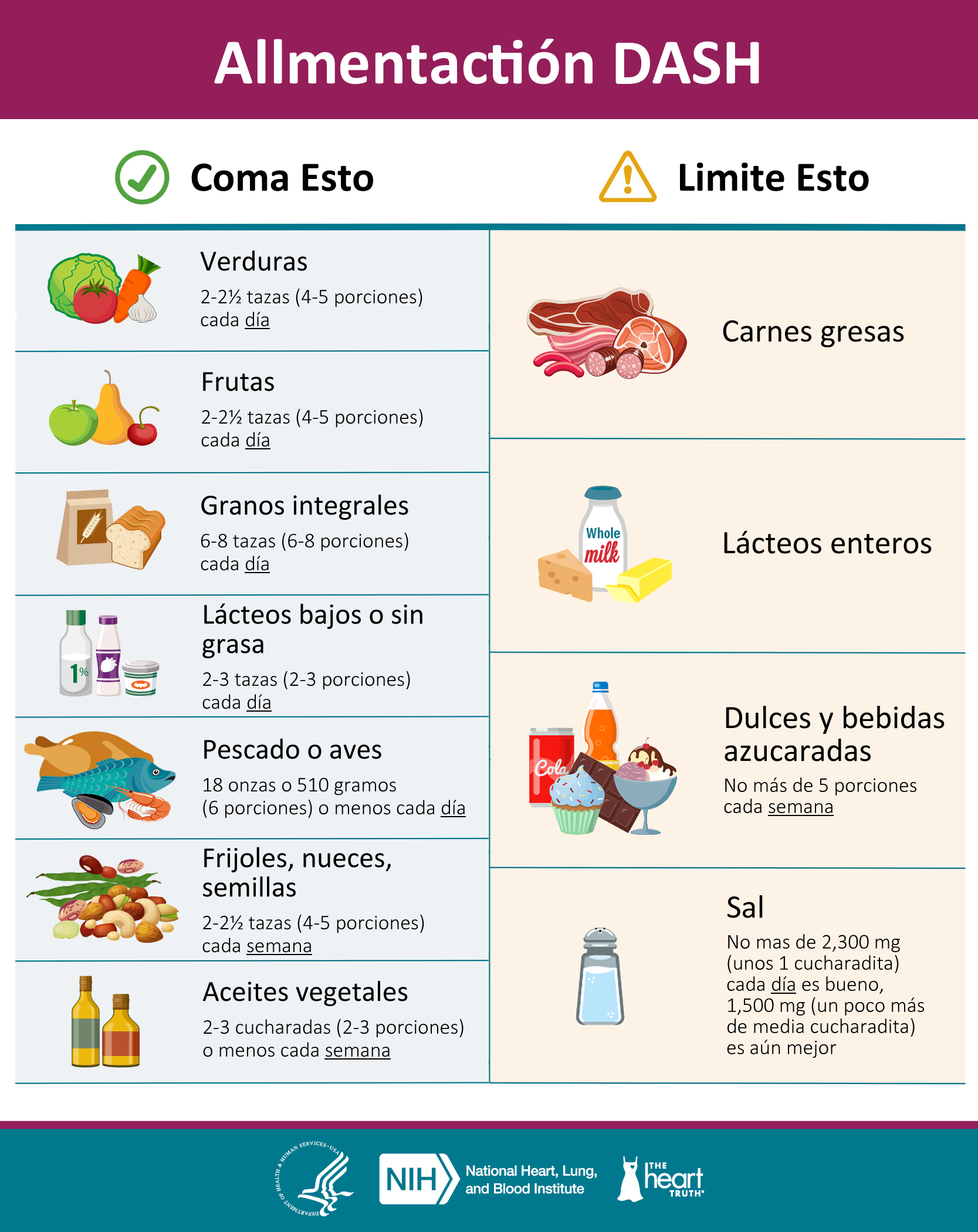According to the National Heart Lung and Blood Institute (NHLBI) of the National Institutes of Health (NIH), the Dietary Approaches to Stop Hypertension (DASH) diet is a flexible and balanced eating plan proven to lower blood pressure (BP), especially if combined with reduction in dietary sodium.1 It does not require special foods but sets daily and weekly dietary goals. It emphasizes the consumption of vegetables, fruits, whole grains, low or no-fat dairy products, fish, poultry, beans, nuts, and vegetable oils while limiting the consumption of foods high in saturated fat (e.g., fatty meats, full-fat dairy products, tropical oils such as coconut, palm kernel, palm oil), salt, and sugar-sweetened beverages and sweets. Examples of daily and weekly servings consistent with the DASH diet are shown in the table below for a 2,000-calorie daily diet.
Table 1. Daily and weekly servings that meet DASH eating plan targets for a 2,000-calorie daily diet.
|
Food Group
|
Daily Servings
|
|
Grains
|
6-8
|
|
Meats, poultry, and fish
|
6 or less
|
|
Vegetables
|
4-5
|
|
Fruit
|
4-5
|
|
Low-fat or fat-free dairy products
|
2-3
|
|
Fats and oils
|
2-3
|
|
Sodium
|
2,300 mg*
|
|
|
Weekly Servings
|
|
Nuts, seeds, dry beans, and peas
|
4-5
|
|
Sweets
|
5 or less
|
*1,500 milligrams (mg) sodium lowers blood pressure even further than 2,300 mg sodium daily.
The DASH diet was originally created as part of a 1997 randomized controlled trial examining the effectiveness of dietary interventions in hypertension control.2,3 The study included 459 adults with systolic blood pressure (SBP) <160 mmHg and diastolic blood pressure (DBP) between 80-95 mmHg. For three weeks, participants ate a control diet low in fruits, vegetables, and dairy products with a fat content typical of the average diet in the United States. After three weeks, participants were randomized to eat one of three diets for eight weeks: the control diet, a diet rich in fruits and vegetables, or the DASH diet (a diet rich in fruits, vegetables, and low-fat dairy products with reduced saturated and total fat intake). Sodium intake was maintained at a constant 3,000 mg daily for all participants, and body weight was maintained at constant levels throughout the trial. Compared to the control diet, the DASH diet lowered SBP by 5.5/3.0 mmHg (p<0.001), and the diet with more fruits and vegetables lowered SBP by 2.8 mmHg (p<0.001) and DBP by 1.1 mmHg (p=0.07). Among the 133 participants with hypertension (SBP ≥140 mmHg or DBP ≥90 mmHg), the DASH diet lowered BP by 11.4/5.5 mmHg compared to the control diet (p<0.001).
The DASH diet has been studied in several follow-on trials. In the DASH-Sodium Trial, reported in 2001, 412 adults were randomized to the DASH diet or usual diet, eating either 3,300, 2,300, or 1,500 mg of sodium daily over the course of 30 consecutive days in a random order.4 Lowering sodium lowered BP regardless of diet, with a greater reduction in the control diet and with greater sodium restriction. Compared to control diet with high sodium intake, intermediate sodium intake lowered SBP by 2.1 mmHg (p<0.001) and DBP by 1.1 mmHg (p<0.01); low sodium intake lowered SBP by 6.7 mmHg (p<0.001) and SBP by 3.5 mmHg (p<0.001). For the DASH diet, intermediate sodium intake lowered SBP by 1.3 mmHg (p=0.03) and DBP by 0.6 mmHg (nonsignificant); low sodium intake lowered SBP by 3.0 mmHg (p<0.01) and DBP by 1.6 mmHg (p<0.01). The DASH diet consistently lowered BP more than the control diet at any sodium level. Compared to the control diet, the DASH diet lowered BP by 5.9/2.9 mmHg with high sodium intake (p<0.001), DBP by 5.0 mmHg (p<0.001) and SBP by 2.5 mmHg (p<0.01) with medium sodium intake, and SBP by 2.2 mmHg (p<0.05) and DBP by 1.0 mmHg (nonsignificant) with low sodium intake.
The findings from the PREMIER trial were reported in 2003.6 The trial enrolled 810 adults of mean age 50 years with 62% women and 34% African Americans. All had above-optimal blood pressure and none were on antihypertensive agents. Participants were randomized to one of three trial arms: 1) a behavioral intervention to implement established guidelines; 2) the same behavioral intervention plus the DASH diet; and 3) dietary advice. No food was provided as part of the study. Both behavioral intervention cohorts saw reduced weight, improved fitness, and lowered sodium intake. The DASH diet cohort also increased fruit, vegetable, and dairy intake. Compared to the dietary advice cohort, SBP was reduced 4.3 mmHg more in the DASH diet cohort and 3.7 mmHg more in the intervention alone cohort (both p<0.01). The difference between the DASH diet and non-DASH diet cohorts was not significant. The proportion with optimal blood pressure (<120/80 mmHg) was 19% in the advice cohort, 30% in the intervention alone cohort (p=0.005 compared to advice), and 35% in the intervention and DASH diet cohort (p<0.01 compared to advice but not significant compared to non-DASH diet). This trial showed that the DASH diet can be implemented in real-world settings and also showed that behavioral interventions to improve diets were effective in lowering blood pressure.
References
- DASH Eating Plan. NIH National Heart, Lung, and Blood Institute. Updated January 10, 2025. Accessed June 30, 2025. https://www.nhlbi.nih.gov/education/dash-eating-plan
- Appel LJ, Moore TJ, Obarzanek E, et al. A clinical trial of the effects of dietary patterns on blood pressure. DASH Collaborative Research Group. N Engl J Med. Apr 17 1997;336(16):1117-24. doi:10.1056/nejm199704173361601
- Sacks FM, Obarzanek E, Windhauser MM, et al. Rationale and design of the Dietary Approaches to Stop Hypertension trial (DASH). A multicenter controlled-feeding study of dietary patterns to lower blood pressure. Ann Epidemiol. Mar 1995;5(2):108-18. doi:10.1016/1047-2797(94)00055-x
- Sacks FM, Svetkey LP, Vollmer WM, et al. Effects on blood pressure of reduced dietary sodium and the Dietary Approaches to Stop Hypertension (DASH) diet. DASH-Sodium Collaborative Research Group. N Engl J Med. Jan 4 2001;344(1):3-10. doi:10.1056/nejm200101043440101
- Sacks FM, Carey VJ, Anderson CA, et al. Effects of high vs low glycemic index of dietary carbohydrate on cardiovascular disease risk factors and insulin sensitivity: the OmniCarb randomized clinical trial. Jama. Dec 17 2014;312(23):2531-41. doi:10.1001/jama.2014.16658
- Appel LJ, Champagne CM, Harsha DW, et al. Effects of comprehensive lifestyle modification on blood pressure control: main results of the PREMIER clinical trial. Jama. Apr 23-30 2003;289(16):2083-93. doi:10.1001/jama.289.16.2083


